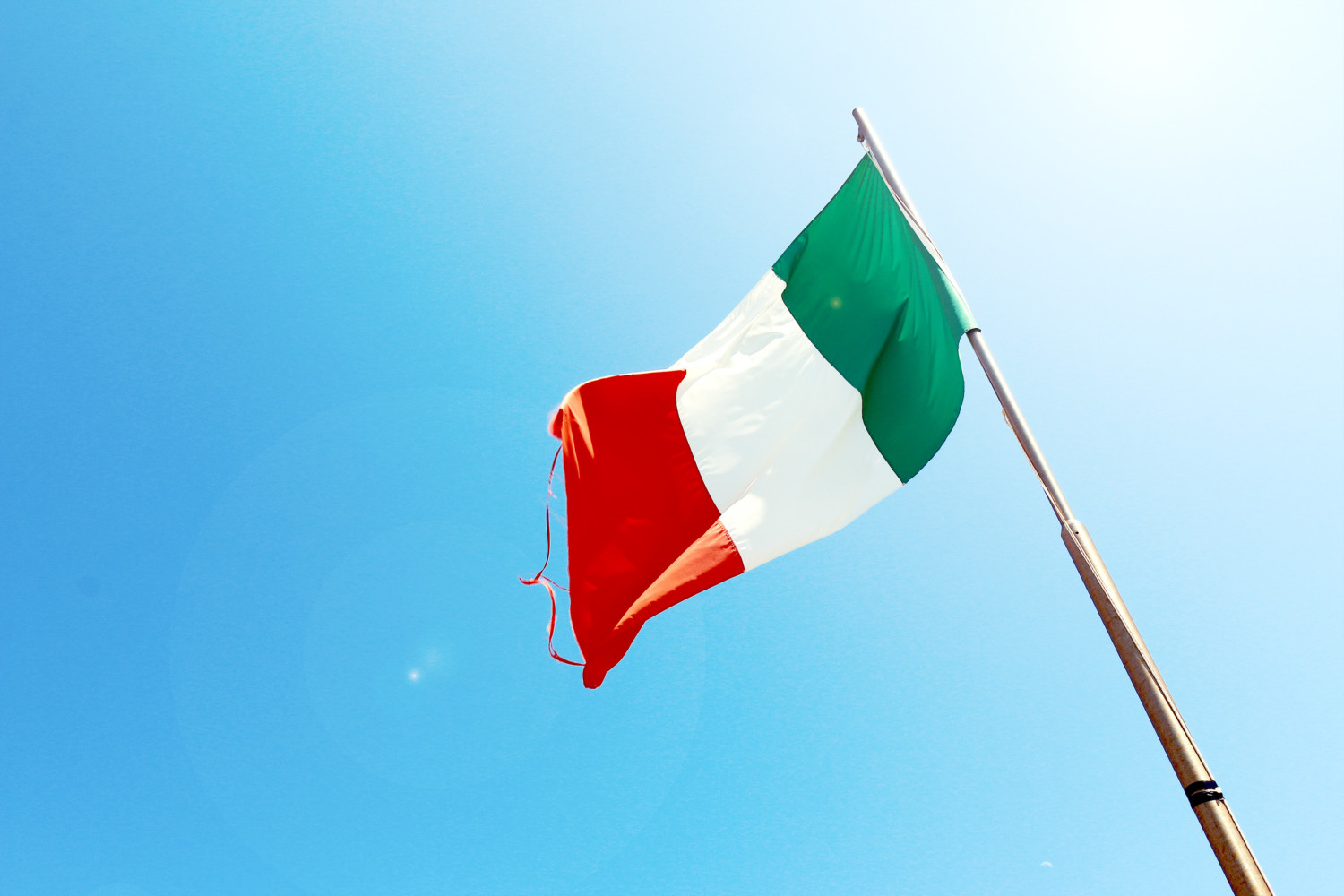Politics
2018 Italian Elections: Can Matteo Salvini’s Lega Win?

Italians head to the polls Sunday, March 4 to participate in the 2018 Italian elections, which could help to fundamentally shift the political landscape of their country and of the greater European continent. The top issue for Italian voters is without a doubt immigration. Can Matteo Salvini’s Lega top the polls in this critical election?
2018 Italian Elections Could Help Shift Country’s Political Landscape
A center-right coalition comprised of four parties – Forza Italia (Forward Italy or Let’s Go Italy), Lega (The League), Fratelli d'Italia (Brothers of Italy), and Noi con l'Italia (Us with Italy) – represents the largest single block, and have a collective backing of around 35-37 percent in the 2018 Italian elections.
Like the majority of European elections which have preceded this one, how Italians cast their votes in the 2018 Italian elections will act as a measure of anti-establishment, populist sentiment inside the country. In case you’ve been living under a rock for the past two to three years, Europe has a seen an unremitting wave of anti-establishment, populist sentiment which has swept across the continent.
This sentiment has given rise to parties like Lega Nord and Five Star Movement in Italy.
Those triumphing in the 2018 Italian elections will play a significant role in shaping Europe's future political landscape at a time when the EU has faced increasing defiance from member states like Hungary, Poland, Czech Republic and to a lesser extent Slovakia.
No products found.
A Brief History of Italian Politics
Since the inception of Italy’s “First Republic,” Italian politics have remained relatively chaotic. Before World War II, Italy was actually a monarchy ruled by kings. In June 1946, the Italian population held a referendum to abolish the ruling monarchy, and thus was born the very first democratic republic of Italy.
Since World War II, the Italian Republic has blown through 64 different heads of state. The “First Republic” survived until about 1992. Its demise came as a result of a series of political corruption scandals implicating most of Italy’s major political parties. The governments formed from that point until present day has been called the “Second Republic,” due to the radical shifts to the parties. Despite the vast changes in party politics within the country, the former Italian Republic’s constitution remained. Italy’s “Second Republic” can be characterized as having almost an institutionally structured level of political instability.
Dissimilar to U.S. presidential elections, the Italian president is not elected directly by the populous, but instead is elected via a secret ballot by parliament and regional representatives. Outsiders have traditionally viewed Italian style democracy as fundamentally flawed due to the fact that its system makes it near impossible to form a majority government.
No products found.
Italian citizens aged 50 years and older are permitted to stand for the presidency. However, if and when they are elected, they are required to resign from any other public office before officially being sworn in.
The Italian parliament has two houses, each with equally proportional power, the Upper House is called the Senate, while the Lower House is known as the Chamber of Deputies. Italian citizens over the age of 18 can cast votes for members of the Chamber of Deputies. However, when it comes to voting in Senate elections, individuals must be at least 25 years old.
The Italian population is exceedingly engaged politically. Even though voting hasn’t been obligatory since 1992, voter turnout among Italians has only dropped below 80 percent once since then.
Italian Parties and Their Leaders
Italy has a multitude of parties and the country’s politics can be characterized by its disoriented scramble of ever-shifting alliances and allegiances. Because of this, the country is renowned for its political instability and dysfunction.
Lega (The League)
The former Lega Nord party, now rebranded as Lega, is Italy’s right-wing populist, pro-Italian working class, Eurosceptic and anti-mass migration party. Lega Nord (LN), was originally founded in the early 1990s and began as a secessionist party which campaigned for the separation of the more affluent north Italy from the poorer south.
Lega Nord was first conceived from a union of regional parties from central and northern Italy. These regions, collectively referred to as Padania, are Lega Nord’s political strongholds. Today, Lega Nord no longer campaigns for secession. However, the party would still like to see the regions that make up Padania hold on to the vast majority of tax revenues generated there.
The party is headed by the charismatic 42-year-old Matteo Salvini. He has been dubbed “The Italian Farage” due to his anti-EU sentiment. Under his leadership, Lega Nord has promised to reevaluate Italy’s membership in the European Union and has referred to the very real possibility of an “Italexit.”
No products found.
Matteo Salvini has also hinted at discontinuing the country’s use of the euro, has pledged to send over 100,000 illegal migrants back to their countries of origin, and has promised to “defend Italian borders from the invasion” of illegal immigrants. In recent years, Italy has seen an unparalleled rise in mass economic migration from North Africa since it’s essentially the closest port for migrants traveling across the Mediterranean. In the past couple years, Lega has seen their support surge in Italy’s opinion polls.
Matteo Salvini has declared that the euro is essentially a failed experiment that is heading towards “catastrophe.” He has said, “Italy has a German mark which they called the euro.” Lega’s party manifesto has described the EU “a strong and fearsome enemy,’ which only Matteo Salvini and his fellow party’s members can adequately oppose.
Matteo Salvini's campaign slogan for the 2018 Italian elections is, “Italians First.” The phrase clearly resembles Donald Trump’s 2016 presidential election catchphrase, “America First.” Matteo Salvini holds the strong conviction that “Italians should come first” and receive any state benefits before economic migrants.
Prior to Donald Trump’s 2016 presidential win, Matteo Salvini frequently shared messages showing solidarity with the then-candidate's political rhetoric and campaign ethos. Matteo Salvini has described President Donald Trump as a “heroic and colorful person” and has said the now-president’s “rigor, his strategy for economic recovery, his security policies, all make me root for Trump.”
Lega is currently polling about 14.8 percent in the 2018 Italian elections.
Matteo Salvini's Lega is part of a center-right coalition with Forza Italia, which currently tops opinion polls. If Lega can manage to increase its popularity in southern Italy, the party could very well outdo Forza Italia on the ballot.
Forza Italia (Forward Italy)
Unfortunately, after numerous sex scandals, heart surgery and tax fraud, the 81-year-old billionaire media tycoon and globalist Silvio Berlusconi has returned to Italian politics. Former Italian prime minister, and convicted tax fraud, Silvio Berlusconi leads the centrist party Forza Italia.
Silvio Berlusconi stands for nothing but his own power and influence. The man shifts his opinions in whatever way the political winds are currently blowing. Currently, Silvio Berlusconi’s platform is pro-EU, pro-euro and pro-international banking organization like IMF and WTO.
If Silvio Berlusconi Forza Italia wins the 2018 Italian elections, he has said that he would hike minimum pensions, dispose of the inheritance tax, institute a flat tax, offer pensions to housewives and provide increased social services to growingly impoverished Italian families.
Despite his primary allies continuously denouncing the EU, the convicted tax fraud has stated that he would like to see more Europe – not less – and has called for more integration of individual states defense, foreign, industrial and monetary policies.
Silvio Berlusconi has said, “I do not think we can leave the euro.”
Forza Italia is currently polling about 15.9 percent in the 2018 Italian elections.
Due to a tax fraud conviction, Silvio Berlusconi is banned from holding public office in Italy until 2019. Thus, in the event that Forza Italia wins the majority of seats in the 2018 Italian elections, Silvio Berlusconi has put forth European Parliament President Antonio Tajani as his prime ministerial nominee.
[wps_products_gallery product_id=”4344570413107, 4334000898099, 4335153741875″]
Democratic Party (PD)
The Democratic Party was conceived in October 2007 via the merging of various center-left and left-wing parties which had previously formed The Union in Italy’s 2006 general election. The majority of the Democratic Party’s founding members came from the “Democrats of the Left,” successor of the Italian Communist Party.
Matteo Renzi, the Democratic Party’s leader and former prime minister, relinquished his post in 2016 after a referendum on constitutional reform failed to pass. Matteo Renzi represents the fifth leader of the Democratic Party in only six years.
The Democratic Party is currently polling about 21.3 percent in the 2018 Italian elections.
Five Star Movement (M5S)
The seemingly anti-establishment, “beyond left- and ring-wing politics,” Five Star Movement (M5S) is led by 31-year-old lawmaker Luigi Di Maio.
According to polls, Five Star Movement, founded in 2009 by Beppe Grillo and Gianroberto Casaleggio, enjoys support just shy of 30 percent of the population and represents Italy’s largest single party and could acquire the greatest number of seats in the Chamber of Deputies.
Luigi Di Maio has repeatedly boasted, “We will be the ones laughing on Monday when Italians will probably take us to 40 percent.” That is highly doubtful.
The 5 Stars Movement derives its name from the “Five Stars,” which refers to its five flagship issues: publicly owned water, sustainable development, right to internet access, eco-friendly and sustainable transport, and environmentalism.
In the past, Five Star Movement has made significant efforts to paint itself as an anti-establishment, populist, anti-immigration, Euroskeptic and pro-environmental party. Until recently, most of these policy platforms seemed genuine. However, under the new leadership of Luigi Di Maio, the 5 Stars Movement has pulled a 180-degree turn on many of these issues, becoming supportive of the European Union, pro-immigration, and ditching talks about abandoning the euro.
Important Issues in the 2018 Italian Elections
Immigration and Crime
Due to its proximity to the coast of North Africa, Italy takes in the highest number of migrants in all of Europe. This crisis will inevitably affect the 2018 Italian elections’ outcome, as it’s putting a tremendous strain on Italy’s working class and its already sputtering economy and dysfunctional social services. For this reason, one would be cruel and insensitive to blame Italians for wanting to put a stop to mass immigration from the third world. Why should they be expected to take care of foreigners when they can’t even take care of their own citizens?
The potential center-right coalition has promised the struggling Italian working class that if elected, they would send approximately 600,000 economic migrants – the number of migrants which have arrived on boats from Libyan shores since 2013 – back to home to their countries of
origin.
Recently, the prolific Italian newspaper, Italian Daily, II Giornale, ran a front-page story titled “More Immigrants = More Crime.” The newspaper cited results from a study recently carried out by the Confcommercio group on the statistical connection between crime and immigration. The study elucidated a clear correlation between the number of economic migrants entering the country and growing crime rates.
Confcommercio group’s analysis discovered that in a given area, if the number of immigrants increases by 1 percent, the crime rate in the same area increases by 0.4 percent.
Furthermore, the research concluded that among Italian citizens there are 4.3 convicted criminals per 1,000 people, while among legal immigrants the rate is nearly double, at 8.5 convicted criminals per 1,000 people. And even more distressing, among illegal immigrants the crime rate skyrockets to more than 50 percent – 148 convicted criminals out of every 247 people.
Bearing this in mind, the idea that anyone questions Italians for wanting out of the EU so that they can control their own borders is truly baffling. Simply put, these pro-mass immigration types have no argument – only virulent ad hominem attacks. And these vicious name calling tactics employed by neoliberal globalists and leftist simply aren’t working anymore. Look no further than the polls to confirm this fact.
The European Union and the Euro
Brussels is trembling because there is a very real possibility that Italy could leave the EU after the 2018 Italian elections. Given that Italy represents the euro zone’s third-largest economy, this would spell disaster for the EU. Whether or not this happens, of course, depends on who’s elected.
The Democratic Party’s Matteo Renzi is pro-EU and has stated, “I believe in the ideals of the EU.”
Five Star Movement’s Luigi Di Maio has signaled euroskepticism in the past, but recently seems to have flip-flopped, saying “We need to renegotiate some EU rules, but not in an in/out referendum.”
Forza Italia’s Silvio Berlusconi is basically pro-EU as he appears fully supportive of international banking institutions and multinational corporations undermining the nation-state at every level.
Lega’s Matteo Salvini is vehemently anti-EU. Matteo Salvini is on record saying, “The laws imposed by Brussels damage Italian artisans, traders, and pensioners.”
Possible Coalitions
Center-Right Coalition
If the center-right coalition formed between Forza Italia, Lega, Fratelli d'Italia and Noi con l'Italia came away with the majority of votes, this would be highly preferable. According to most media outlets and polls, this seems to be the most likely of outcomes in the 2018 Italian elections.
Antonio Noto, head of the Noto polls agency has given this coalition, led by pro-working class, right-wing populist and outspoken euroskeptic, a 50 percent chance of leading the alliance, overtaking Forza Italia in votes. This would be the best case scenario.
A government led by Matteo Salvini would likely join the ranks of the irreverent and combative Visegrád countries (Poland, Hungary, Czech Republic and Slovakia), who refuse to capitulate to EU tyranny.
A win for the center-right coalition would represent a glorious victory for euroskeptics, those against unchecked globalization and global capitalism and for those wishing to maintain their cultural, religious and ethnic identities in the midst of unrelenting waves of mass migration from the third world.
The prospect of this coalition coming out on top, with Matteo Salvini leading it, makes ivory tower leftist bureaucrats in Brussels quiver in fear.
Grand Establishment Coalition
If a single party fails to win an overall majority, another possibility analysts have
surmised is the formation of a “grand coalition between the Democratic Party and Forza Italia. This coalition would represent the continuation of the current failing status quo – pro-establishment, pro-mass immigration and pro-EU.
Populist Pact
Recently, former White House Chief Strategist and Executive Chairman of Breitbart News Steve Bannon, who’s currently visiting Italy, has called a coalition between Lega and Five Star Movement. He called this coalition the “ultimate dream.”
When the ballots are counted, Five Star Movement is expected to become the largest single party. However, most of Italy’s most prominent parties have already stated that they’ll refuse to form a coalition with Five Star Movement. Thus, leader Luigi Di Maio will only obtain the mandate if two scenarios occur – one if his party wins a majority of seats, and two if he can somehow forge a coalition government with such backing.
This is where Lega’s Matteo Salvini comes into play. In October, he said that if the center-right coalition failed to win a majority, he would indeed call Beppe Brillo – the co-founder of the 5 Stars Movement – in an attempt to form a ruling coalition. It’s not completely unlikely that the two parties could find some common ground from which to build on together. They would both like to ditch pension reform, which seeks to raise the retirement age, revamp Italy’s relationship with the EU (although perhaps in different ways), and ditch the euro.
Ivory tower academic, Erik Johns, an International Political Economy professor at Johns Hopkins University in Bologna has said, “The populist pact is the most worrying option for investors.”
Another ivory tower academic – presumably a Marxist – Roberto D'Alimonte of Rome's LUISS University said that an outcome leading to the formation of this “populist pact” would be “catastrophic” for the markets.
It sounds quite similar to the type of fear-mongering spewed by the internationalist mainstream media, Marxist academics and neo-liberal, globalist politicians before the Brexit referendum and America’s 2016 presidential election. Perhaps it’s time these international “investors,” globalist EU bureaucrats, and useless Marxist academics were a bit worried.












